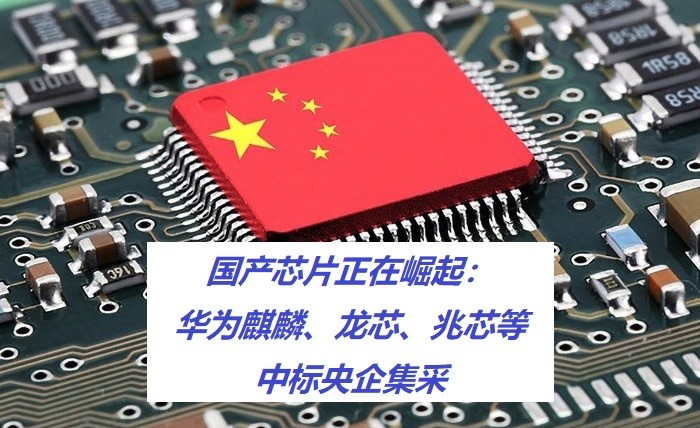In the context of the reshaping of the global semiconductor industry pattern, China's domestic chip manufacturers are making historic breakthroughs. Recently, domestic processor brands such as Huawei Kirin, Loongson Zhongke, Zhaoxin and Feiteng have successfully won the bid in the centralized computer procurement project of a large central enterprise group. This not only marks the maturity of domestic chip technology, but also an important embodiment of the country's independent and controllable strategy. China Exportsemi will introduce you to the details of this winning bid, and try to analyze the road ahead of the rise of domestic chips.
Loongson's leap
In this centralized procurement, Loongson Zhongke won the bid with 8,000 desktops and notebooks based on Loongson 3A5000 and 3A6000, becoming the leader in bid section 1. As a 100% self-developed new generation of quad-core processor, Loongson 3A6000 has a single-threaded performance 60% higher than that of 3A5000, and the overall performance is comparable to Intel's 10th generation Core quad-core processor. In the SPEC CPU 2006 test, the 3A6000 scored 54.2 for single-core and 142 for multi-core, demonstrating computing power comparable to that of mainstream international processors.
Zhaoxin's stable performance
Zhaoxin won the bid with 24,000 desktops and notebooks based on its processor platform, and although the specific model was not disclosed, this number is enough to prove the market recognition of its products. With its high efficiency, compatibility and security, Zhaoxin's processor provides a solid support for national industrial information security.

Figure: Domestic chips are on the rise: Huawei Kirin, Loongson, Zhaoxin and other central enterprises have won the bid for centralized procurement
Strong growth of Feiteng
Feiteng's 24,000 desktop terminals based on its Tengrui D2000 processor also won in the centralized procurement. As a new generation of desktop processors from Feiteng, the performance of the Tenrui D2000 has jumped significantly, with a bandwidth of 18.7GB/s, a SPECint test score of 97.45, and a SPECfp test score of 94.62, which is nearly twice the original and shows strong growth potential.
Huawei Kirin's industry influence
Huawei's Kirin technology route won the bid in Bid No. 5, with a bid amount of nearly 100 million yuan, further confirming Huawei's deep accumulation and influence in the chip industry. Huawei's Kirin processor's excellent performance and security provide strong support for the future development of domestic chips.
The competitiveness of domestic chips in the international market: advantages and challenges
The competitiveness of domestic chips in the international market is gradually increasing. In the first half of 2024, the export value of integrated circuits will reach 542.74 billion yuan, with a year-on-year growth rate of 25.6%. This growth is not only due to the progress of domestic chip technology, but also closely related to the increase in global market demand.
Advantage analysis
1. **Technology maturity and capacity expansion**: Domestic chips have obvious advantages in mature processes, and it is expected that by 2025, China's chip production capacity will increase by 14%, with a monthly output of 10.1 million wafers, accounting for more than 30% of the world's total.
2. Strong pull of market demand**: With the arrival of the peak consumer electronics consumption season and the increase in demand for memory chips by artificial intelligence, the capacity utilization rate of global semiconductor manufacturing plants is expected to exceed 80% in the second half of 2024.
3. **Policy support and investment increase**: The state attaches great importance to the semiconductor industry, and provides a good environment for the development of domestic chips through policy support and capital investment.
Challenge analysis
1. **High-end process technology gap**: Although progress has been made in mature processes, compared with the international advanced level, there is still a large gap in high-end process technology for domestic chips, especially in the manufacture of advanced lithography machines, which still mainly rely on imports.
2. **Supply chain and ecological construction**: The ecological construction and supply chain perfection of domestic chips need to be improved. Especially in the field of AI chips, the ecological implementation of software and hardware needs to be further improved, including the improvement of the software stack, the shortening of the adaptation cycle, and the verification of performance and reliability.
3. **Talent Shortage Problem**: The integrated circuit industry is facing the problem of talent shortage, although there are a large number of graduates in related majors every year, the proportion of those who choose to join the industry is low, and measures need to be taken to improve the attractiveness of the industry.
Comprehensive analysis
These bid-winning events not only represent a major progress in domestic processor technology, but also indicate the important role of the domestic semiconductor industry in key areas of the country. With the continuous maturity of technology and the gradual recognition of the market, domestic processors are expected to achieve wider applications and deeper autonomy and controllability in the future. At the same time, it is also a powerful response to the foreign technology blockade, demonstrating China's competitiveness and development potential in the global semiconductor industry.
In this process, domestic chip manufacturers need to continue to increase R&D investment, optimize product performance, and strengthen cooperation with software developers to improve ecosystem construction to achieve wider market applications. In addition, the support at the policy level and the cultivation of the market environment are also crucial, and it is necessary to provide a stronger guarantee for the development of domestic chips.
In short, the rise of domestic chips is not only a victory for technological breakthroughs, but also a manifestation of national strategic autonomy and controllability. With the continuous progress of domestic chip technology and the increasing maturity of the market, we have reason to believe that domestic chips will occupy a more important position in the global semiconductor industry.






